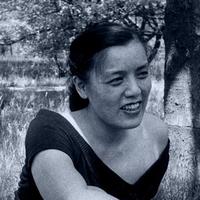Rediscovering Her Roots
Grace Lee Boggs notably was not heavily involved with issues pertaining to the Asian American community throughout her activist life. However, she slowly began to reconnect with her Chinese heritage and politics in the last three decades of her life. Previously, Boggs’ engagement with Asia and Asian Americans were mostly with her praise for Mao’s China and involvement in the Asian American Movement in the 1960s. She notably praised Mao Zedong for creating “structures and programs to transform the masses into representatives of the New Man and the New Woman,” and praised the political theory behind his philosophy. She specifically identified with Mao’s discussions on learning from practice, and structural transformation. However, she began to revisit her Asian identity in the last few decades of her life by visiting China, learning Chinese and reflect on her Asian upbringing (Living for Change).
Bogg did organize at least one group within the Asian American community: the Detroit Asian Political Alliance. This alliance was organized in 1970 year, at a time when Asian Americans were being inspired to organize their own anti-Vietnam War movements. Grace points out in her autobiography that this was the first time she was meeting regularly with politically inspired people who shared her background as being Asian. She attended anti-Vietnam War protests with them as well as held workshops to help Asian Americans discover and develop their identities. Her political experience working with fellow Asian Americans for a short period of time helped her understand the specific marginalization Asians faced in the United States due to the context of the Cold War and immigration restrictions.
Grace Lee Boggs did not identify herself as Asian American as the term did not exist in broad discourse until the 1970s. Growing up, she had felt ambivalent about being Chinese as she disliked the way people reacted to her Chineseness and hated being perceived as exotic. While Boggs identified herself as more American than Chinese, she recognized that she had been socialized through her Chinese upbringing to think of herself in relation to others instead of as an individual. Her engagement with community members, especially in meetings, usually took the form of her listening as a Chinese American woman in an all Black space.
References
http://www.boggsschool.org/grace-and-jimmy
http://americanrevolutionaryfilm.com/
Living For Change: An Autobiography. Grace Lee Boggs. Minneapolis: University of Minnesota Press, 1998
https://www.radioproject.org/2012/02/grace-lee-boggs-berkeley/
https://onbeing.org/programs/grace-lee-boggs-a-century-in-the-world/
Fu, May. "Grace Lee Boggs and Detroit's Asian Political Alliance, 1970-1972" Paper presented at the annual meeting of the American Studies Association Annual Meeting, Renaissance Hotel, Washington D.C., <Not Available>. 2014-11-28 <http://citation.allacademic.com/meta/p318474_index.html>

